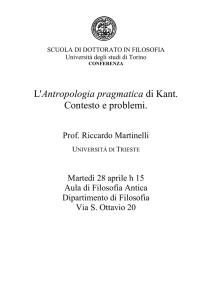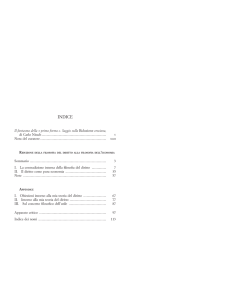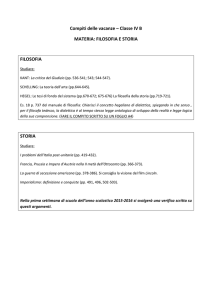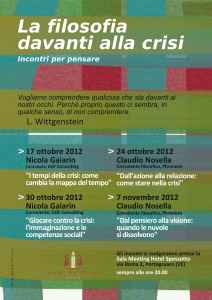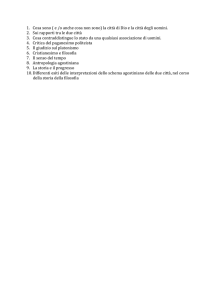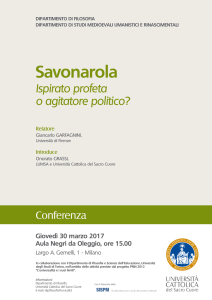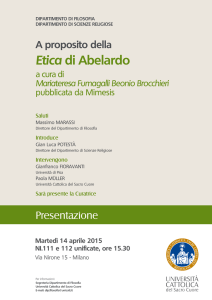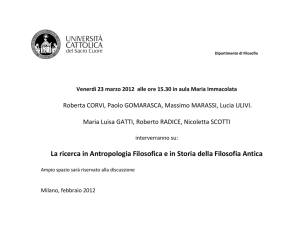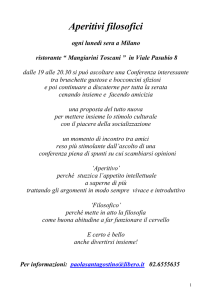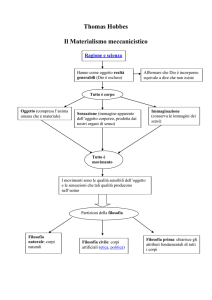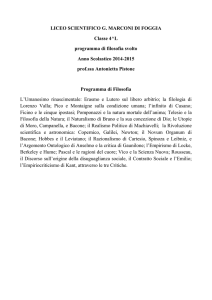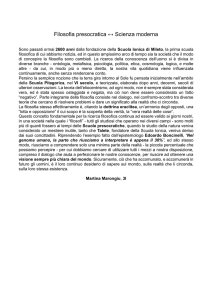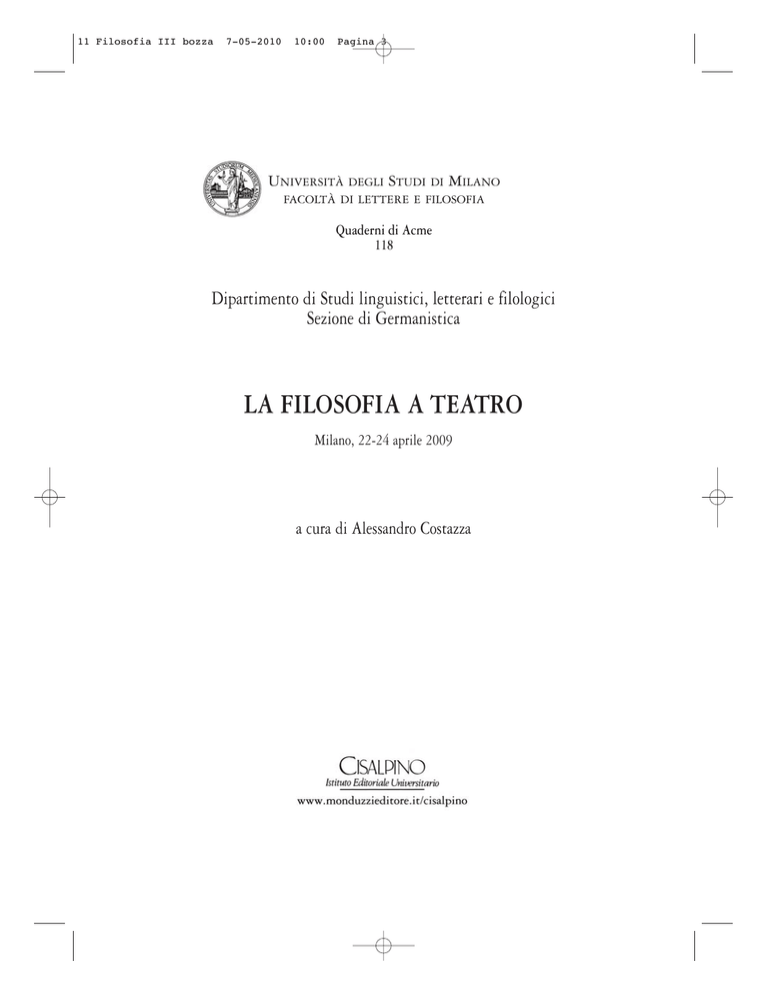
11 Filosofia III bozza
7-05-2010
10:00
Pagina 3
UNIVERSITÀ DEGLI STUDI DI MILANO
FACOLTÀ DI LETTERE E FILOSOFIA
Quaderni di Acme
118
Dipartimento di Studi linguistici, letterari e filologici
Sezione di Germanistica
LA FILOSOFIA A TEATRO
Milano, 22-24 aprile 2009
a cura di Alessandro Costazza
11 Filosofia III bozza
7-05-2010
10:00
Pagina 1
Quaderni di Acme
11 Filosofia III bozza
7-05-2010
10:00
Pagina 2
11 Filosofia III bozza
7-05-2010
10:00
Pagina 3
UNIVERSITÀ DEGLI STUDI DI MILANO
FACOLTÀ DI LETTERE E FILOSOFIA
Quaderni di Acme
118
Dipartimento di Studi linguistici, letterari e filologici
Sezione di Germanistica
LA FILOSOFIA A TEATRO
Milano, 22-24 aprile 2009
a cura di Alessandro Costazza
11 Filosofia III bozza
7-05-2010
10:00
Pagina 4
QUADERNI DI ACME – Comitato scientifico
Isabella Gualandri (dir.) – Livio Antonielli, Giorgio Bejor, Claudia Berra,
Elisa Bianchi, Giovanni Cianci, Gianfranco Fiaccadori, Renato Pettoello
In copertina: Giorgio De Chirico, La commedia e la tragedia, 1926. Olio su tela,
cm 146x114, Mart, VAF - Stiftung, Rovereto.
Realizzazione editoriale: Simonetta Pavesi
ISBN 978-88-205-1004-6
Copyright © 2010
CISALPINO. Istituto Editoriale Universitario – Monduzzi Editoriale S.r.l.
VIA B. EUSTACHI, 12 – 20129 MILANO
Tel. 02/20404031
[email protected]
Finito di stampare nel mese di aprile 2010 da GECA, Cesano Boscone (MI)
11 Filosofia III bozza
7-05-2010
10:00
Pagina 5
INDICE
La filosofia a teatro
di Alessandro Costazza . . . . . . . . . . . . . . . . . . . . . . . . . . p.
9
Executive Summary
di Alessandro Costazza . . . . . . . . . . . . . . . . . . . . . . . . . . »
35
IL FILOSOFO A TEATRO
IL FILOSOFO COME AUTORE
Seneca tragico vs. Seneca filosofo. Nuovi approcci
a una vecchia querelle
di Chiara Torre . . . . . . . . . . . . . . . . . . . . . . . . . . . . . . . »
41
La tragedia della responsabilità. Filosofia e teatro
in Jean Paul Sartre
di Paolo Bignamini e Mauro Carbone . . . . . . . . . . . . . . . . »
63
IL FILOSOFO COME INTERPRETE O ‘INTERPRETANTE’
Donna Inger eroina del tragico moderno. Una lettura
di Ibsen attraverso Kierkegaard
di Andrea Meregalli . . . . . . . . . . . . . . . . . . . . . . . . . . . . »
75
11 Filosofia III bozza
7-05-2010
10:00
Pagina 6
Teatro, storia e filosofia delle immagini. Wedekind,
Klages e “il gran teatro del mondo”
di Giancarlo Lacchin . . . . . . . . . . . . . . . . . . . . . . . . . . . »
95
Teatro e libertà. Mimesi, stupore e straniamento fra Brecht
e Platone
di Andrea Capra . . . . . . . . . . . . . . . . . . . . . . . . . . . . . . »
113
IL FILOSOFO COME PERSONAGGIO
I filosofi a teatro? Fanno ridere. Le Nuvole di Aristofane
di Giuseppe Zanetto . . . . . . . . . . . . . . . . . . . . . . . . . . . . . »
135
Il filosofo come personaggio teatrale nel Settecento francese.
Riflessioni e conversazioni in scena
di Mariangela Mazzocchi Doglio . . . . . . . . . . . . . . . . . . . »
151
La filosofia? Cosa da pazzi. Immanuel Kant di Thomas
Bernhard
di Gabriella Rovagnati . . . . . . . . . . . . . . . . . . . . . . . . . . »
169
Empedocle figura di Hölderlin. Filosofi sulle scene
del Novecento
di Marco Castellari . . . . . . . . . . . . . . . . . . . . . . . . . . . . . »
185
TEMATICHE FILOSOFICHE
ORDINE E REALTÀ DEL MONDO
Antigone contro il sofista
di Mauro Bonazzi . . . . . . . . . . . . . . . . . . . . . . . . . . . . . »
205
La vita è sogno. Contraddizioni di un’immagine
di Mariateresa Cattaneo . . . . . . . . . . . . . . . . . . . . . . . . . »
223
Teodicea e filosofia della storia in La morte di Danton
di Georg Büchner
di Alessandro Costazza . . . . . . . . . . . . . . . . . . . . . . . . . . »
243
11 Filosofia III bozza
7-05-2010
10:00
Pagina 7
“Pensa, porco! (Pausa …)”. La filosofia sul palcoscenico
di Samuel Beckett
di Markus Ophälders . . . . . . . . . . . . . . . . . . . . . . . . . . . . »
263
Brodskij e il problema del tempo in Marmi
di Fausto Malcovati . . . . . . . . . . . . . . . . . . . . . . . . . . . . »
285
INFLUSSI FILOSOFICI SUL TEATRO
“Mettendo nell’arte pensiero e riflessione”. Euripide e
la Sofistica
di Maddalena Giovannelli . . . . . . . . . . . . . . . . . . . . . . . . »
295
L’eredità dei Lumi nel teatro italiano di fine Settecento
di Paolo Bosisio . . . . . . . . . . . . . . . . . . . . . . . . . . . . . . . »
317
Aharon Halle Wolfssohn e il teatro della Haskalah
di Anna Linda Callow . . . . . . . . . . . . . . . . . . . . . . . . . . »
337
Friedrich Nietzsche e il dramma espressionista tedesco
di Moira Paleari . . . . . . . . . . . . . . . . . . . . . . . . . . . . . . »
349
RIFLESSIONI SUL LINGUAGGIO
Hofmannsthal fra teatro e filosofia. Con particolare riguardo
a L’uomo difficile
di Fausto Cercignani . . . . . . . . . . . . . . . . . . . . . . . . . . . . »
369
La tautologia in scena e la morte del Fato. Il teatro di
parola di Alberto Moravia
di Gianni Turchetta . . . . . . . . . . . . . . . . . . . . . . . . . . . . »
387
Kaspar e il soggetto della conoscenza contemporanea.
Un dialogo tra Peter Handke e Michel Foucault
di Antonello Romano . . . . . . . . . . . . . . . . . . . . . . . . . . . . »
409
Giochi linguistici e acrobazie filosofiche nel teatro di
Tom Stoppard
di Mariacristina Cavecchi . . . . . . . . . . . . . . . . . . . . . . . . »
431
11 Filosofia III bozza
7-05-2010
10:00
Pagina 8
ESTETICA TEATRALE
IL TEATRO COME CONOSCENZA
Rappresentare un assoluto
di Simona Chiodo . . . . . . . . . . . . . . . . . . . . . . . . . . . . . . »
455
Aristotele, il mito, la tragedia e la filosofia
di Pierluigi Donini . . . . . . . . . . . . . . . . . . . . . . . . . . . . . »
469
Rappresentazione e coscienza simbolica
di Elio Franzini . . . . . . . . . . . . . . . . . . . . . . . . . . . . . . . »
483
IL PARADOSSO DELL’ATTORE E DELLO SPETTATORE
L’ombra del ‘paradosso’ nell’estetica attoriale di
Jean-Baptiste Du Bos
di Maddalena Mazzocut-Mis . . . . . . . . . . . . . . . . . . . . . . »
495
‘Personanza’. Georg Simmel e il teatro
di Andrea Pinotti . . . . . . . . . . . . . . . . . . . . . . . . . . . . . . »
515
Estetica della fruizione teatrale. La virtualità della scena
e l’esperienza dello spettatore
di Chiara Cappelletto . . . . . . . . . . . . . . . . . . . . . . . . . . . »
535
Indice dei nomi . . . . . . . . . . . . . . . . . . . . . . . . . . . . . . . . . »
557
11 Filosofia III bozza
7-05-2010
10:00
Pagina 34
11 Filosofia III bozza
7-05-2010
10:00
Pagina 35
EXECUTIVE SUMMARY
This book presents the proceedings of the interdisciplinary conference “La filosofia a teatro” (“Philosophy at the Theatre”, University of
Milan, April 22th-24th, 2009) and consists of twenty-eight papers
investigating the mutual relations between philosophy and theatre
from several different perspectives. The time span covered in the book
ranges from Ancient Greece to the present day. The contributions focus
on major representatives of both disciplines: poets and playwrights like
Aeschylus, Euripides, Aristophanes, Seneca, Calderón, Hölderlin,
Büchner, Ibsen, Hofmannsthal, Wedekind, Brecht, Sartre, Moravia,
Bernhard, Handke and Stoppard, and philosophers like Gorgias, Plato,
Aristotle, Seneca, Diderot, Kierkegaard, Nietzsche, Simmel, Klages,
Wittgenstein and Sartre.
The papers have been grouped in three areas: the first, THE
PHILOSOPHER AT THE THEATRE, includes the subsections: “The
Philosopher as a Dramatist”; “The Philosopher as a Reader”; “The
Philosopher as a Character”; the second, PHILOSOPHICAL ISSUES, has
the following subsections: “Order and Reality of the World”; “The
Influence of Philosophy on Theatre” and “Reflections on Language”; the
third is devoted to AESTHETICS OF THE THEATRE and includes two
subsections: “Theatre as a Form of Cognition” and “The Actor’s and the
Audience’s Paradox”. Alessandro Costazza, the editor of the volume,
argues in his introduction that this thematic division actually discloses
a more complex and somewhat more challenging internal organization,
based on the five components of human communication: sender, receiver,
context, message, code. This may help to provide a comprehensive panorama of the mutual interactions between philosophy and theatre.
11 Filosofia III bozza
36
7-05-2010
10:00
Pagina 36
Executive Summary
As an overall tendency, the various contributors seem to suggest that
philosophy and theatre still have different languages. Even when theatre
deals with purely philosophical topics, the inherent ambiguity and, one
would dare say, the inconsistency of its expressiveness do not allow one
to draw univocal conclusions, which, in turn, promotes further reflection. Ambiguity and contradiction may at first glance be regarded as
negative aspects of theatrical communication; still, after a closer look,
they prove to be a plus, as they grant playwrights an opportunity to go
beyond the frames of systematic thinking and to call our attention to
“blind alleys” that cannot be fully grasped inside the philosophical system. Even satire, which is usually deemed not to be at all philosophical,
may play this critical role. It emerges, moreover, that especially poetic
language, with its creative freedom, richness and openness, may lead
drama to break the chains of schematic rational language. In some of the
papers a parallel is drawn between theatrical representation and philosophical knowledge: this underlines the partiality and limited nature of
human knowledge on the one hand; still, it allows us, on the other, to
revalue the productive and creative function of philosophy based on dialogue and multi-perspectives.
Alessandro Costazza

